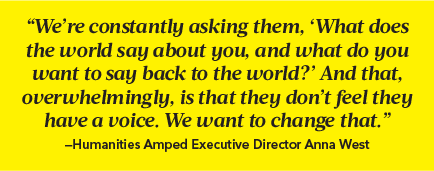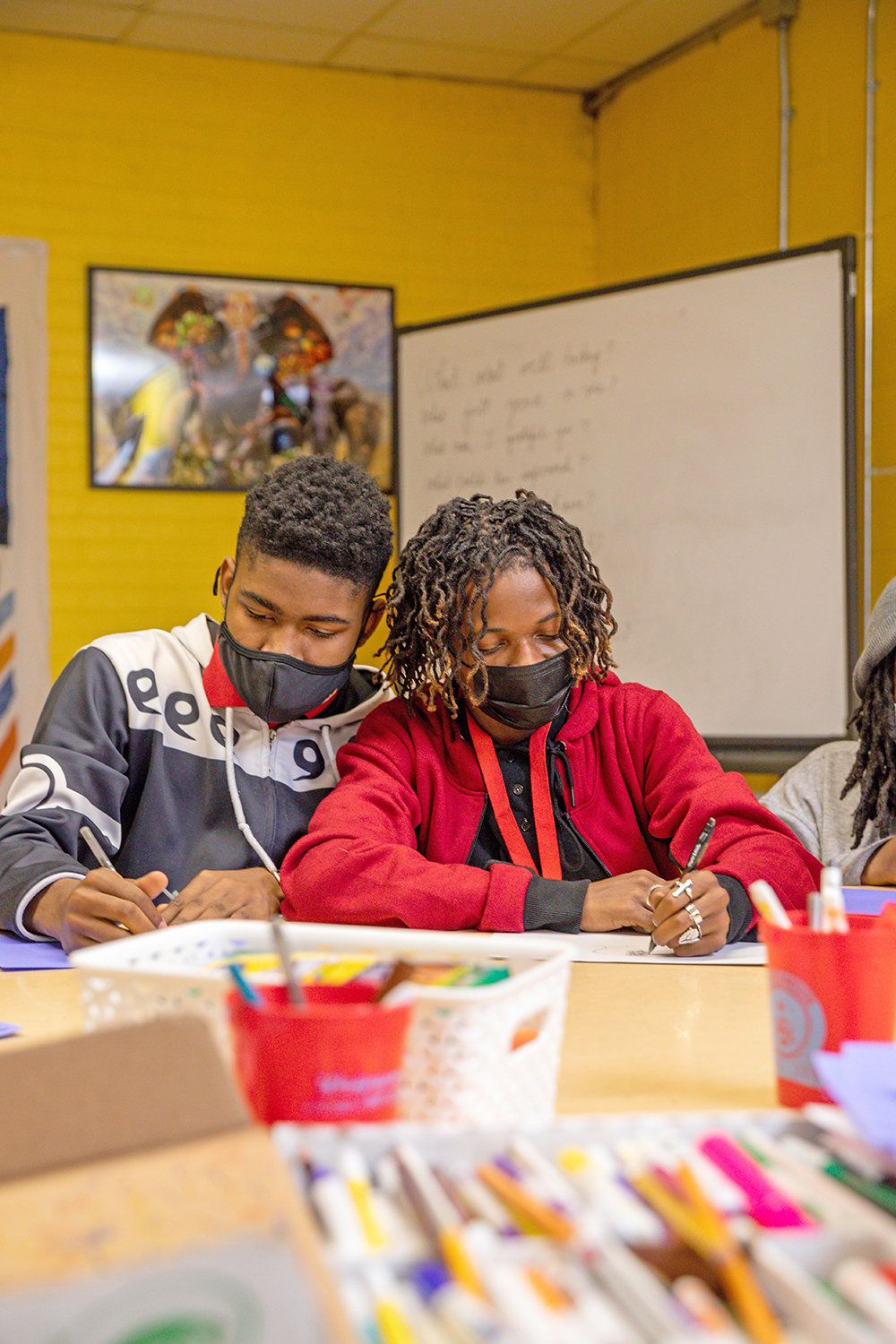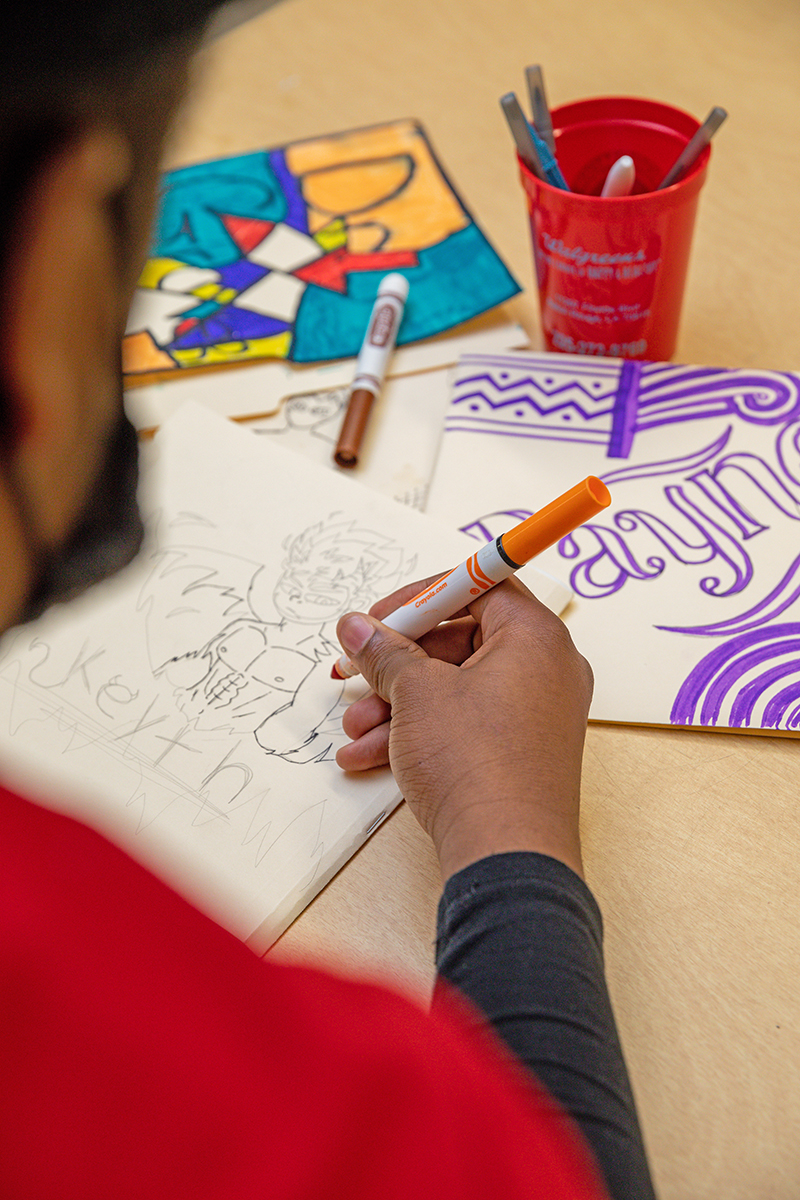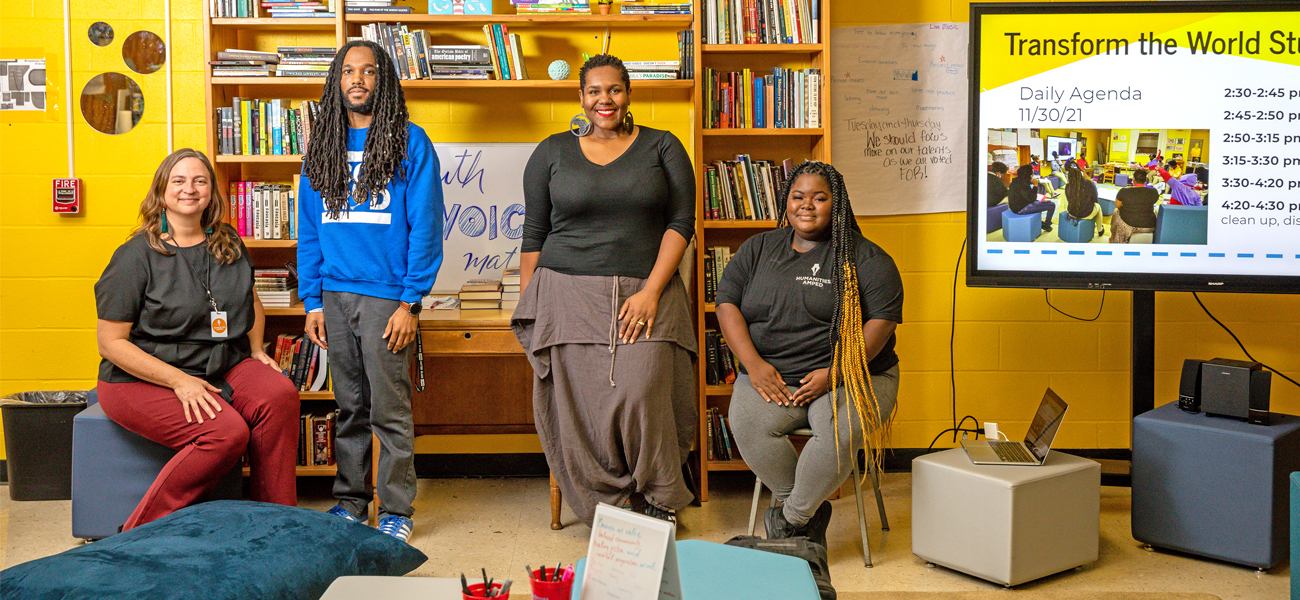Walk into the “The Galley” at Broadmoor High School, and it’s easy to see that this is a different sort of classroom. The cinder block walls are painted canary yellow. Forget rows of desks—colorful hexagonal ottomans, the kind that can be arranged quickly into a circle, are the seat of choice. There’s a snack area, and plenty of spots to lounge and talk. A white board in one corner lists neither homework assignments nor the names of problem students. Instead, it holds nine neatly written reflection questions. One asks, “What went well today?” Others pose, “What am I grateful for?” and “What do I want to let go of?”
Imagine being asked such questions in high school. It’s a time of stress for any student, much less young people who live in poverty, have negligible adult support and might have experienced other forms of trauma. But for the Baton Rouge nonprofit Humanities Amped, addressing the social and emotional needs of students and creating a safe space for them is fundamental to their academic success and their growth as human beings.
The program, which includes after-school tutoring and enrichment classes, career counseling and other activities, uses educational methods that help kids who live with high levels of personal stress begin to heal. Known as restorative educational practices, these methods allow young people to talk through personal difficulties with the support of a team of caring adults and peers, so that they can perform better in school.
|
|
|
Humanities Amped’s goal is to help high school students become critical readers, writers and thinkers who are equipped with problem-solving skills that can change their lives, and may even change the world.
“It’s not just about the humanities in the traditional sense as subjects,” says Executive Director Anna West. “It’s also about being human.”
Student Tristan Verrett, who wants to be an actor, says participating in the reflection questions during Humanities Amped’s after-school programs helps bring his day into focus. “When you reflect, you’re like, taking in everything that you’ve experienced during the day,” Verrett says. “They’re really helpful.”
Along with English teacher Destiny Cooper, West founded Humanities Amped in 2014 at McKinley High School as a way to test using restorative educational practices in an academic setting. Students were encouraged to share life experiences in a seated circle, which helped build a classroom culture that valued caring for each other’s wellbeing. The students also conducted research projects about community issues that moved them personally, such as gun violence or blight. These projects helped them begin to develop a sense of agency, West says.
After three years, data showed students in Humanities Amped classes were 29% more likely than their peers to graduate from high school on time. And since the average dropout rate in Baton Rouge is 30%, that meant the program could close the gap on kids leaving school, West says.
McKinley graduate and Humanities Amped staff member Tareil George says today she would have dropped out of high school had it not been for the program she began participating in as a sophomore.
“I didn’t really have support in my family for school, and coming to Humanities Amped, the staff kept telling me, ‘I believe in you,’ and ‘You need to believe in yourself,’” says George, who became an intern with the program before joining the staff. “The love, the healing and the determination made me believe.”

Amped up for the future
Humanities Amped made local news in late 2020 as one of four nonprofits that will take over the former Sarkis Rug Store on Government Street to create the new Youth City Lab facility. Along with Front Yard Bikes, Big Buddy and Line 4 Line, Humanities Amped will transform the iconic Mid City building into a one-stop-shop for youth to build their confidence and skills.
Over its seven-year history, Humanities Amped expanded from McKinley to work in five schools, but West says after the coronavirus pandemic interrupted operations, it gave her team a chance to reevaluate how the nonprofit functions best. “We like being in one place, where we can really build a community,” West says.
In fall 2021, Humanities Amped reopened in Broadmoor High, a school with a high poverty rate as well as a large population of English language learners.
“It’s a tremendous asset to have a partner who is focused on the social and emotional needs of our students,” Broadmoor High principal Robert Wells says. “A lot of students are facing the long-term trauma associated with poverty, so it makes a big difference to be able to offer this.”
West says the program is building out several components that will help the site become a “community lab” for social and emotional learning. This includes tutoring and enrichment programs delivered in a way that allows students to have a say in how they’re run.
“It’s really important to us that there is democratic participation,” West says. “It’s one of our core practices.”
Currently at Broadmoor High, Humanities Amped offers an after-school program that features visual and dramatic arts and leadership development on Tuesdays and Thursdays. Poetry and performance have long been a subset of Humanities Amped—it absorbed the spoken word program Forward Arts in 2019. (West founded Forward Arts’ predecessor, Wordplay, which was first situated in Big Buddy.)
At Broadmoor, Humanities Amped also provides academic tutoring on Mondays and Wednesdays, and college and career counseling during two different class periods each day. Called the Dreamkeeper College and Career Program, this service helps students think about what they want to do in life, and develop a plan to get there.

Looking out for students
West says plans are also underway to turn The Galley into a wellness center of sorts, where students are welcome to stop by during lunch, or during the day if they simply need to cool down and de-stress.
“Oftentimes, a student just finds it’s hard to be present at school for whatever reason,” West says. “So we see this as a place where we can provide what we call ‘community care conferences,’ where you can have some quiet time to get settled and have a conference with one of our staff.”
Students facing more serious issues can be referred to traditional school counseling, but others who just need a listening ear will be able to return to class with improved focus and confidence, West says.
Student Quynn Lewis says dropping by The Galley has been a gamechanger.
“Honestly, this is the most social I have ever been in my entire life,” Lewis says. “When school makes me lose my mind, I come in here.”
|
|
|
One of Humanities Amped’s biggest objectives is to empower vulnerable young people to feel that they can enact change, both in their personal lives and in their communities.
“We’re constantly asking them, ‘What does the world say about you, and what do you want to say back to the world?’” West says. “And that, overwhelmingly, is that they don’t feel they have a voice. We want to change that.” humanitiesamped.org
This article was originally published in the January 2021 issue of 225 magazine.





